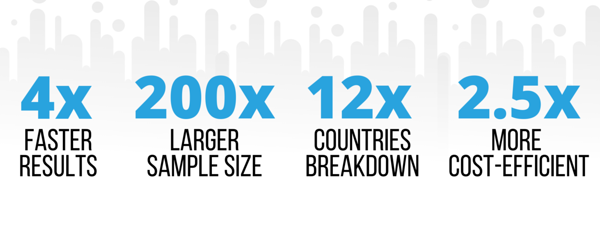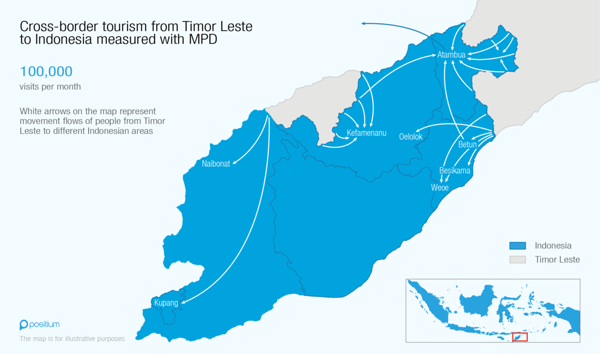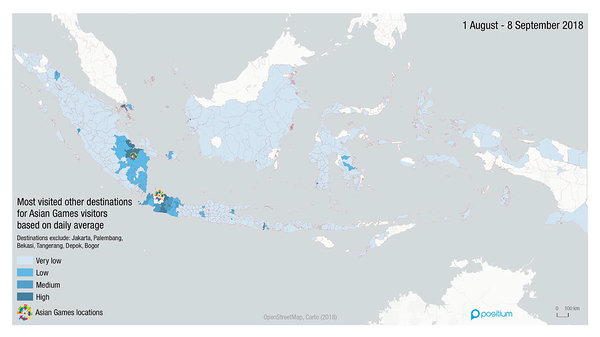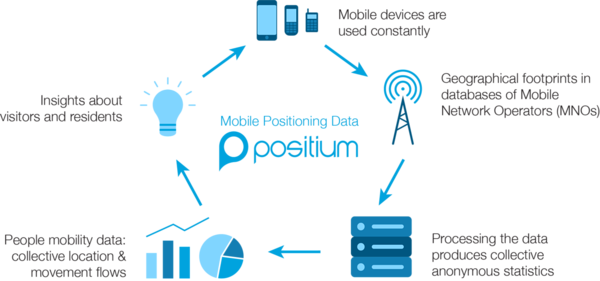All of that is possible thanks to the mobile phones in our pockets.
Positium was recognised as an Affiliate Member of the UN World Tourism Organisation this year, which is why it seems more appropriate than ever to bring to you 10 reasons why MPD is the upgrade tourism statistics needs.
1. Recognised and reliable – Positium collaborates with several international organisations on standards for MPD-based statistics. These organisations are interested in big data being used more widely to reduce the data gap between developed and emerging countries. In 2014, Eurostat commissioned a Feasibility Study on how MPD can be used in tourism statistics. This manual, co-authored by Positium as the project lead, is still one of the best manuals available on the topic.
2. Already established solution – The UN World Tourism Organisation releases a
tourism statistics compendium each year and based on this, so far, there are
two countries in the world producing MPD-based statistics – Estonia and
Indonesia. MPD has been used by Eesti Pank (central bank of Estonia) since 2008
as the leading data source for travel statistics, including travel item
calculations, and inbound and outbound tourist flows. On the other side of the world, Indonesia’s Ministry of Tourism
developed a system to count tourists in formerly excluded border areas in
support of the United Nations Sustainable Development Goal 8 (SDG 8 –
sustainable growth and job creation) through accurate data. In both countries, the number of visitor arrivals is calculated using a system which Positium created for the specific purposes of MPD-based statistics production, based on international standards for tourism statistics and local concepts agreed upon with Eesti Pank and BPS Statistics Indonesia, respectively.
3. Secure – The protection of this sensitive data source is ensured by telecoms safeguarding their business interests and via privacy protection rules and telecom regulations. Using MPD requires the anonymisation of data and/or legal authority, and/or commercial agreement to access and process the data. As a data analytics company, we are to follow the GDPR and all other data security protocols to ensure privacy.
4. Timely – MPD allows for quick results that depict the latest situation and are therefore most relevant for planning and decision-making. For example, in Estonia, Positium’s solution turns over data every month, while surveys used to be done twice a year with a few months of turnaround time added before Eesti Pank could use the new data.
5. Precise – Once proper methodology has been applied, MPD becomes a reliable source of data for measuring the mobility of people. Understanding the whereabouts of people is essential for better measurement of many SDGs. MPD allows measuring tourism at a precise level and comparing it to benchmark levels and the nature of tourism.
6. Every destination visit – There is a great number of both local and
foreign tourists visiting a country. Understanding where tourists are at a
given moment can be crucial information for emergency disaster relief or better
planning of local law enforcement. For example, a de facto application
was used for planning the distribution of patrol cars in Estonia. Every
municipality in Estonia (>200) was mapped out and for each of them daily
data on the number of people in the municipality was provided. Spikes appeared
on weekends and peaks in summers. It allowed the police to plan when, where and
how many of their cars should be patrolling the area.
7. Every event visit – Tourism does not just occur in popular destinations. Events, such as the Asian Games 2018, draw in hordes of people. The novel approach in tourism statistics provided BAPPENAS (the Indonesian Ministry of National Development Planning) with results in just two weeks after the event ended, while ticket sales offices and surveying had yet to produce their summaries. The study was conducted in collaboration with BPS Statistics Indonesia and Telkomsel.
8. Large sample size – There are more mobile connections than people
in the world. This means that the data collected by all the mobile phones is
truly big data. Having a large sample of people helps to thoroughly understand
tourists’ needs and motivations for travel. It allows for better
decision-making and increases inclusivity.
9. Cost-efficient – Traditional ways of producing tourism
statistics with surveys have several drawbacks, including the cost of planning,
conducting and analysing the surveys. At the UNSD Big Data Conference in Kigali,
BPS Statistics Indonesia told the audience that because of MPD 8 data scientists can now do the work of 8000 enumerators (who used to do the domestic tourism survey). Opting for MPD is an investment that pays
off in the long run thanks to fewer surveys, increased transparency and better
decisions. As a bonus, you can easily present your statistics on a map for
effective data visualisation.
10. No burden on tourists – When travelling, we can only imagine how annoying it can be to have to answer a survey. Luckily, gathering MPD does not place any burden on tourists. MPD can be collected from any phone when the cell ID becomes the location footprint. This data is then stored by the relevant mobile network operator and can be accessed and processed only after proper security protocols have been applied.
Find out more about our travel statistics
solutions on our Tourism page.
Would you be interested in learning more about mobile big data and Positium? Let's talk about what mobile big data can do to help your organisation make decisions based on population mobility.
.png)




